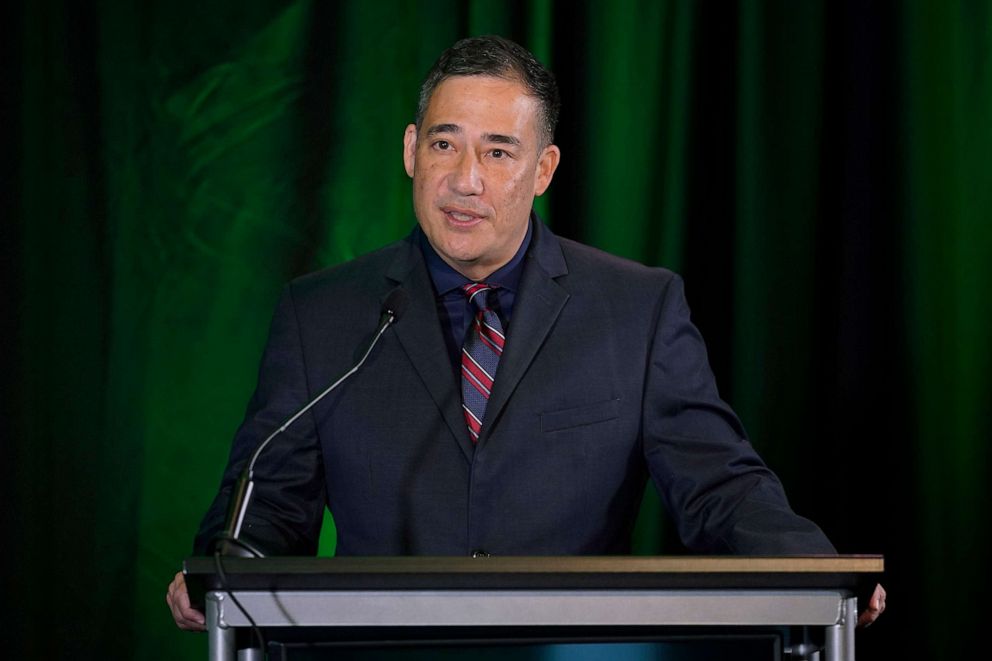华盛顿州的立法者正在寻求超越一些用于政治误导的技术工具,以免他们进一步破坏公众对政府的信任。
州参议院通过一项法案上个月,这将为政治候选人在民事法庭上提供法律保障,反对政治广告中使用的“深度伪造”视频、音频和图像。
“深度假货”通常是任何形式的被篡改和操纵以歪曲某人的媒体,通常以某种方式显示该人说了一些从未说过的话。
华盛顿证券交易所。要求通过该法案的州政府官员史蒂夫·霍布斯告诉美国广播公司,这种经过修改的视频还没有被正式用于竞选活动,但世界各地的几个团体正在恶意使用它们。
“我们正试图超越它,”霍布斯告诉ABC新闻。
霍布斯引用了去年俄乌冲突开始时发布的一段“深度伪造”视频,该视频错误地显示乌克兰总统弗拉基米尔·泽伦斯基(Volodymyr Zelenskyy)呼吁士兵向俄罗斯人投降。尽管观众和世界领导人能够识破骗局,视频也被从社交媒体网站上撤下,但霍布斯表示,公众很容易受到类似类型的操纵。
“你最不希望看到的就是政治运动或政治行动委员会把广告从他们试图淘汰的人的‘深度伪装’中剔除出来,”他说。“即使那则广告在人们意识到它是一个‘深度骗局’前一两天就出现了,它也会造成损害。”
该法案将竞选公职活动中的合成媒体定义为“一个人的外貌、言语或行为的图像、录音或录像,这些图像、录音或录像通过使用生成性对抗性网络技术或其他数字技术被有意操纵,以创建一个真实但虚假的图像、音频或视频,对一个理性的个人来说,这些图像、音频或视频在外表、行为或言语上是真实的,而实际上并未发生。”
根据该法案,成为“深度造假”视频受害者的候选人可以“寻求禁令或其他公平救济,禁止发布此类合成媒体。”
该法案于2月15日以35票对15票通过了州参议院。
州众议院举行了一次听证会在州政府中一些选民对该法案的措辞表示担忧。
从事视频工作的约书亚·哈德威克告诉委员会,他反对该法案,因为目前的措辞没有澄清什么是“深度伪造”,或者出于清晰或艺术目的编辑的图像或视频。
“如果我使用滤镜,将彩色图像变成黑白或棕褐色,或者我想缩短一部分内容,一些可能不被认为是合成的东西就会被包括在内,”他作证说。
霍布斯认为,该法案的语言显然不包括照片或视频编辑在其定义。他补充说,它并不打算侵犯人民的第一修正案的权利。

2022年8月17日,华盛顿国务卿史蒂夫·霍布斯在华盛顿奥林匹亚与皮尔斯郡审计员朱莉·安德森进行辩论。
泰德·沃伦/美联社,档案
“如果你想通过第一修正案,去追一个有广告的人,并且你有一个政治立场,那是你的权利。但是,拍摄某人的图像或视频,并对其进行修改,使其看起来像是在发表他们没有说过的演讲,这是错误的,”霍布斯说。
众议院委员会和全体议员投票表决该法案的时间表尚未确定。霍布斯说,在讨论之后,可能会对语言和修正案进行调整,但强调“深度造假”运动是需要尽快采取立法行动的主题。
“我们必须做点什么,我们不能什么都不做。我们需要其他州采取[保障措施]和联邦政府采取行动,”他说。
Washington state bill would provide safeguards against 'deepfake' political ads
Washington state legislators are looking to get ahead of some technological tools used for political misinformation before they say they further disrupt the public trust in government.
The state Senatepassed a billlast month that would provide political candidates with legal safeguards in civil court against "deepfake" videos, audio and images that are used in political ads.
"Deepfakes" are typically any form of media that has been altered and manipulated to misrepresent someone, typically in a way that shows the person saying something that was never said.
Washington Sec. of State Steve Hobbs, who requested the bill, told ABC News that such altered videos haven't been officially used in campaigns, but several groups around the world are using them with malicious intent.
"We're trying to get ahead of it," Hobbs told ABC News.
Hobbs cited a "deepfake" video released last year at the start of the Russian-Ukraine conflict that falsely showed Ukrainian President Volodymyr Zelenskyy call on soldiers to surrender to the Russians. Although viewers and world leaders were able to see through the deception and the video was taken down from social media sites, Hobbs said that the public is vulnerable to similar types of manipulation.
"The last thing you want is political campaigns or political action committees to put ads out of the 'deepfakes' of the person they are trying to vote out," he said. "Even if that ad was up a day or two before people realize it's a 'deepfake' it can cause damage."
The bill defines synthetic media in campaigns for elective office as " an image, an audio recording, or a video recording of an individual's appearance, speech, or conduct that has been intentionally manipulated with the use of generative adversarial network techniques or other digital technology in a manner to create a realistic but false image, audio, or video that produces a depiction that to a reasonable individual is of a real individual in appearance, action, or speech that did not actually occur in reality."
Under the bill, candidates who are the victim of a "deepfake" video could "seek injunctive or other equitable relief prohibiting the publication of such synthetic media."
The bill passed the state Senate on Feb. 15 with a 35-15 vote.
The state House of Representatives held apublic hearingin the State Government& Tribal Relations committee on March 10 and some constituents expressed concern about the language of the bill.
Joshua Hardwick, who works in video, told the committee he opposed the bill because the current language didn't clarify what constitutes a "deepfake" or an image or video edited for clarity or artistic purposes.
"If I apply a filter, make a color image black and white or sepia, or I want to shorten a part of the content and some things that may not be considered synthetic would be included," he testified.
Hobbs contended that the bill's language clearly does not include photo or video edits in its definition. He added that it does not intend to infringe on people's First Amendment rights.
"If you want through the First Amendment, go after someone with ads and you have a political stance, that's your right. But to take someone's image or video and change it to make it look like they're making a speech that they didn't say, that's just wrong," Hobbs said.
The timetable for the bill to be voted in the House committee and the full chamber haven't been set. Hobbs said there will likely be tweaks to the language and amendments following the discourse but stressed that "deepfake" campaigns are topics that need legislative action fast.
"We have to do something, we just can't do nothing. We need other states to put up [safeguards] and the federal government to take action," he said.






